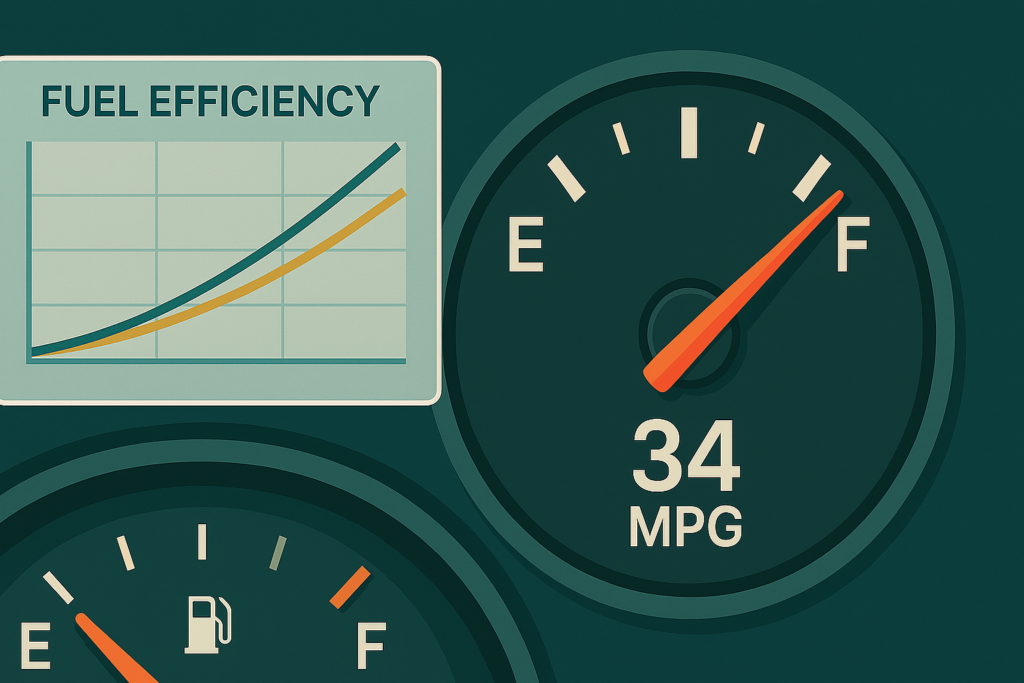In an era of rising fuel prices and growing environmental awareness, tracking fuel efficiency is more important than ever. Whether you’re commuting to work, road-tripping across the country, or managing a fleet of vehicles, understanding how efficiently your vehicle uses fuel can save you money—and reduce your carbon footprint. The key tools in this process are MPG (miles per gallon) and mileage cost calculators. These tools help drivers monitor fuel efficiency, compare vehicles, and make informed decisions about driving habits and maintenance.
In this article, we’ll break down the differences between MPG, mileage cost, and overall fuel efficiency. We’ll explore how to use MPG and mileage cost calculators, show a real-world comparison between an economy car and an SUV, and offer tips on how to track and improve your vehicle’s efficiency over time.
🛠 Understanding MPG, Mileage Cost & Fuel Efficiency
These three terms often overlap, but they refer to slightly different measurements:
MPG (Miles Per Gallon)
This is a measure of how far your vehicle can travel using one gallon of fuel. Higher MPG = better fuel efficiency. It’s the most common fuel efficiency metric in the U.S.
- City MPG: Estimated fuel efficiency during stop-and-go urban driving
- Highway MPG: Estimated fuel efficiency on open roads at steady speeds
- Combined MPG: Weighted average based on a mix of city and highway driving
Mileage Cost
This refers to the cost of fuel per mile driven. It’s calculated by dividing the current fuel price by the vehicle’s MPG. It shows how much you’re actually spending to drive each mile.
For example:
If gas is $3.80/gallon and your car gets 25 MPG:
Cost per mile=253.80=$0.152 (or 15.2 cents)
Fuel Efficiency
This is a general term encompassing how effectively a vehicle uses fuel. It includes MPG, mileage cost, driving habits, maintenance, and other factors that impact performance.

Quickly convert Miles per Gallon (MPG) to Liters per 100 km (L/100km) and other fuel efficiency units with this accurate, responsive calculator. Easy to use, mobile-friendly, and perfect for drivers and travelers.
🔍 MPG vs. Mileage Cost vs. Fuel Efficiency: Key Differences
| Metric | What it Measures | Units | Importance |
|---|---|---|---|
| MPG | Distance traveled per gallon | Miles/gallon | Compares vehicle fuel performance |
| Mileage Cost | Fuel cost per mile | $/mile | Shows cost impact based on fuel prices |
| Fuel Efficiency | Overall fuel use effectiveness | Variable | Broad view; includes driving behavior, tuning |
Each has its own value. MPG helps when comparing vehicles. Mileage cost helps in real-time budgeting. Fuel efficiency gives you the big picture.
⚙️ How to Use MPG & Mileage Cost Calculators
Tracking fuel performance isn’t hard—especially with digital tools. Here’s how to start.
Step 1: Record Your Vehicle’s MPG
You can either:
- Look up your car’s official EPA-rated MPG (via FuelEconomy.gov)
- OR calculate real-world MPG yourself using this formula:
MPG=Miles DrivenGallons Used\text{MPG} = \frac{\text{Miles Driven}}{\text{Gallons Used}}MPG=Gallons UsedMiles Driven
For example:
- You drove 350 miles
- You refilled 12 gallons
35012=29.2 MPG\frac{350}{12} = 29.2 \text{ MPG}12350=29.2 MPG
Step 2: Use a Mileage Cost Calculator
Input:
- Your MPG
- Local fuel price
Tools like MPG Calculator.net, Drivvo, and Fuelly do this instantly and often track it over time.
🚗 Case Study: Economy Car vs SUV
Let’s compare a fuel-efficient compact car vs a full-size SUV to see how this plays out in real numbers.
| Metric | Toyota Corolla (Eco Car) | Ford Explorer (SUV) |
|---|---|---|
| City MPG | 32 | 20 |
| Highway MPG | 41 | 27 |
| Combined MPG | 36 | 23 |
| Fuel Price | $3.90/gallon | $3.90/gallon |
| Cost per mile | $0.108 | $0.169 |
| Monthly Driving (1000 mi) | $108/month | $169/month |
Result: The SUV costs roughly $61 more per month in fuel alone if you drive 1,000 miles. That’s over $700/year—just on fuel!
This kind of comparison is invaluable when budgeting, choosing between vehicles, or planning long trips.
📅 Regular Monitoring: How Often & Why
Tracking fuel efficiency isn’t just a one-time task. Like any performance metric, it should be monitored regularly for two key reasons:
- Catch changes early: Sudden MPG drops can signal maintenance issues like:
- Dirty air filters
- Low tire pressure
- Failing spark plugs
- Fuel system problems
- Adjust driving habits: Frequent data shows the impact of:
- Aggressive driving
- Excessive idling
- City vs. highway usage
Best practice:
- Track MPG every time you fill up (use apps or keep a logbook)
- Review trends monthly
- Update local fuel prices weekly for accurate cost-per-mile data
🛠 Tips to Improve Your Vehicle’s Fuel Efficiency
Even small adjustments can yield noticeable improvements. Here’s how to get more miles (and dollars) from every gallon.
✅ Maintenance
- Inflate tires to the recommended pressure
- Change air filters every 12,000–15,000 miles
- Use the right motor oil grade
- Regular tune-ups to keep engine performance high
✅ Driving Habits
- Accelerate gradually, avoid hard stops
- Use cruise control on highways
- Avoid excessive idling (over 1 minute is wasteful)
- Limit use of AC and roof racks
✅ Trip Planning
- Combine errands to reduce cold starts
- Use apps like Google Maps or Waze to avoid traffic
- Fill up at off-peak times to avoid fuel station surcharges
🚀 Final Thoughts
Tracking fuel efficiency through MPG and mileage cost calculators is one of the smartest habits any driver can adopt. Not only does it help you save money, but it also makes you a more environmentally conscious and informed vehicle owner.
Whether you’re analyzing your daily commute or planning your next road trip, these tools give you the insights needed to optimize performance, reduce costs, and drive smarter. So the next time you fill up your tank, don’t just look at the total—you’ll know how much every mile is truly costing you.

